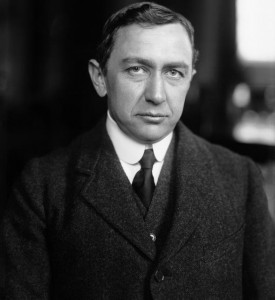 As I mentioned Monday, Ivy Ledbetter Lee is not a role model and he’s far from perfect. But the Georgia native did play an influential role in establishing the field of public relations. And he created some of the PR tactics still used today.
As I mentioned Monday, Ivy Ledbetter Lee is not a role model and he’s far from perfect. But the Georgia native did play an influential role in establishing the field of public relations. And he created some of the PR tactics still used today.
Lee, the son of a Methodist minister, began his studies at Emory College here in Atlanta. He graduated from Princeton and worked as a stringer for several New York newspapers, including the New York Times.
Lee started his public relations career in 1903. He was hired by the Citizens’ Union as a publicity manager. The title sounds very contemporary but the job then was much different than what you would imagine today. At the time, a publicity manager would be a low-level position with little power or influence. Almost immediately, Lee developed an unusual report with his bosses and news reporters.
After a stint in politics and the Democratic National Committee, Lee was hired in 1906 by the anthracite coal industry to advise how to settle a strike. At that time he wrote a policy called “Declaration of Principles” and promised to deal honestly with the press and public. He began escorting reporters to his client’s work sites and strike locations.
For many in academia, the “Declaration of Principles” elevates Lee to “founding father” status. Others say Lee never followed his principles. He just wrote the principles for show, they say.
Lee hit his stride and found his fame working with the railroads, including Pennsylvania Railroad and John D. Rockefeller, Jr.
In 1915, Lee wrote a book about a subject very near and dear to the heart of Atlantans: Railroads.
The railroads were seeking legislation from Congress but, were very unpopular with the public. Lee wanted to make it easier for Congress to pass favorable legislation so he employed a tactic that is still popular today: personalize the battle. Lee sought to take the emphasis away from the corporations and wealthy executives.
So how did he do this? Here’s a clip from the introduction to “Human Nature and Railroads:”
Lee described the public as “reasonable.”
“They know the impossible cannot be performed,” he said.
Here’s one more section from the book that I find interesting and relevant to today:
Lee’s campaign worked and the legislation passed with strong support from the Interstate Commerce Commission.
An interesting side note about the “Human Nature and Railroads” is that the published words were first used as speeches to the business community. That’s a PR tactic that still has value today.
Ivy Ledbetter Lee may not be the cleanest of PR heroes but neither were his contemporaries. Edward Berneys, the other founding father of PR, received his title largely for his work to popularize cigarette smoking among women by associating smoking with women’s suffrage, calling cigarettes “Torches of Freedom.”
But Lee’s role, for better or worse, should not be forgotten. Lee was in there pitching with the best of them.
The following sources were helpful in writing this history of Ivy Ledbetter Lee: